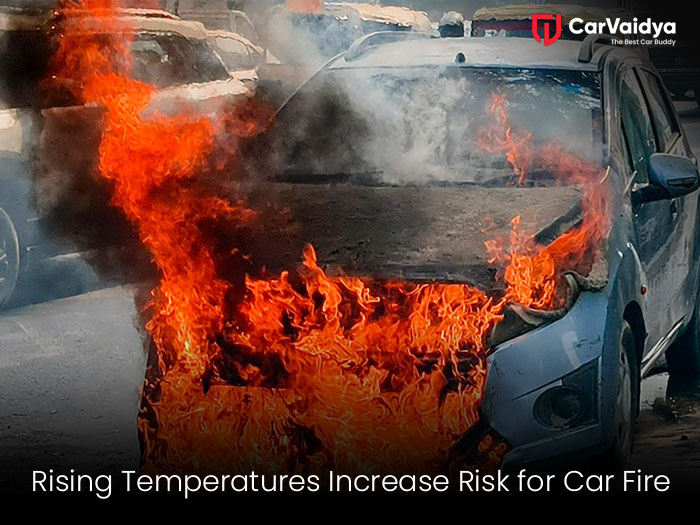As temperatures rise, the likelihood of car fires increases, prompting a surge in reports of vehicles catching fire. This alarming trend underscores the importance of ensuring your car is in optimal condition, especially during the summer months when high temperatures can exacerbate potential issues. Here's a detailed look at the factors contributing to this phenomenon and practical steps you can take to prevent your car from becoming a statistic.
The Heat Factor
Summer heat can be relentless, causing various parts of a vehicle to expand and become more susceptible to damage. High temperatures can lead to overheating, which can stress the engine and other components. When combined with the presence of flammable fluids like gasoline, oil, and coolant, the risk of a fire significantly increases.
Common Causes of Car Fires
Several factors can contribute to a car catching fire, particularly during hot weather:
Overheating Engines: An engine running hotter than usual can ignite oil or coolant leaks. Regularly checking and maintaining the cooling system is crucial.
Electrical Failures: Faulty wiring or electrical systems can spark and ignite nearby flammable materials. Ensure that all electrical components are in good working order and replace any worn-out wires.
Fuel System Leaks: Leaks in the fuel system are a common cause of fires. Fuel can drip onto hot engine parts, causing a fire. Regular inspection for any fuel smell or visible leaks can help prevent this.
Improper Maintenance: Neglecting regular maintenance can lead to various issues that increase fire risk. Routine checks of oil levels, brake fluid, and other vital components are essential.
Accidents: Collisions can damage a vehicle’s fuel tank, electrical system, or engine, potentially causing a fire. While accidents are not always preventable, having a well-maintained vehicle can reduce the risk.
Preventative Measures
To mitigate the risk of your car catching fire, especially as temperatures soar, consider the following preventative measures:
Regular Inspections: Have your vehicle inspected by a professional mechanic at least once a year. They can identify and fix potential fire hazards before they become serious problems.
Maintain the Cooling System: Ensure that the radiator, coolant, and thermostat are in good working condition. Replace any components that show signs of wear or damage.
Check for Leaks: Regularly inspect your vehicle for any fluid leaks, including oil, fuel, and coolant. If you detect a leak, address it immediately to prevent it from contacting hot engine parts.
Monitor Electrical Systems: Pay attention to any electrical issues, such as flickering lights or malfunctioning components. Have any electrical problems diagnosed and repaired promptly.
Proper Storage of Flammable Materials: Avoid keeping flammable materials in your car, especially during the hot summer months. If you must transport them, ensure they are stored safely and securely.
Be Cautious with Modifications: Aftermarket modifications, especially to the engine or electrical system, can increase fire risk if not done correctly. Have modifications performed by a professional and ensure they comply with safety standards.
Use Quality Parts: Always use high-quality replacement parts. Cheap or counterfeit parts may not meet safety standards and could increase the risk of a fire.
Keep Your Car Clean: Accumulated grease and debris in the engine bay can catch fire. Regularly clean your engine bay to remove any flammable build-up.
What to Do If a Fire Starts
If you notice smoke or flames coming from your vehicle, follow these steps to ensure your safety:
Pull Over Immediately: As soon as you notice smoke or flames, pull over to a safe location away from traffic.
Turn Off the Engine: Shut off the engine to stop the flow of fuel, which can feed the fire.
Evacuate: Get everyone out of the vehicle and move to a safe distance. Car fires can escalate quickly, and the risk of explosion is real.
Call for Help: Dial emergency services to report the fire. Do not attempt to extinguish the fire yourself if it has spread beyond a small, manageable area.
Do Not Open the Hood: Opening the hood can supply more oxygen to the fire, making it worse. Wait for emergency responders to handle the situation.
Conclusion
As the summer heat intensifies, so does the risk of car fires. By staying vigilant and proactive with vehicle maintenance, you can significantly reduce the likelihood of experiencing such a dangerous event. Regular inspections, proper maintenance, and being aware of potential hazards are key to keeping your vehicle safe. Remember, the cost of preventative measures is far less than the potential cost of a car fire, both in terms of finances and safety. Stay safe and enjoy the summer with peace of mind, knowing your car is in top condition.
Read Some Other Articles Also
Enhancing Your Driving Experience Installing a Sunroof In Your Car
Tips for Charging Your Car Battery during Drug A Road Trip
Tips for Buying a Used Car a Comprehensive Guide


0 Comments